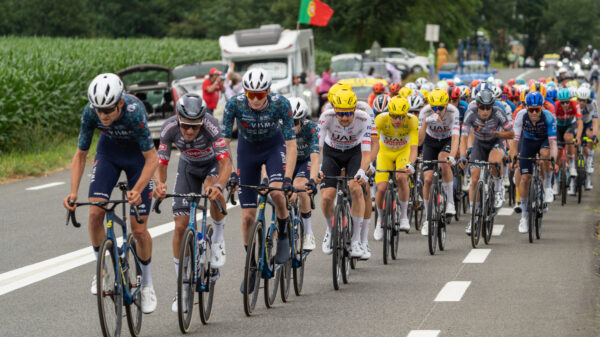Staff Writer Tamara Kormornick on why “Blue Jean”, an award-winning archival drama with contemporary relevance, deserves a permanent spot in the queer film canon. This review is supplemented by quotes from a Director’s Q and A at Soho House on February 11 2022 which featured Director Georgia Oakley, Producer Hélène Sifre and Lead Actress Rosy McEwen.
It is not hard to see why interest in “Blue Jean” has been gaining momentum with audiences since its premiere at the Venice Film festival last year, where it took home the People’s Choice Award. The film brilliantly captures the hushed experiences of British lesbian teachers and their communities during a period of threat which only came to an end twenty years ago. Shot in 16mm, Georgia Oakley’s directorial debut prioritises delicacy over boldness and invites the audience into queer and non-queer spaces through the perspective of a woman whose livelihood becomes increasingly threatened by government legislation.
The film centres around the titular character, Jean, a secondary school PE teacher in the northeast of England during Thatcher’s government. The year 1988 is significant, as it is when legislation known as Section 28 was proposed which prevented local authorities from the “promotion of homosexuality” by local authorities and included education.
Throughout the film, Jean’s struggle to straddle two worlds on either side of the River Tyne intensifies. In one world, she hides her sexuality from judgemental colleagues and the teenage netball squad. In the other, she plays pool in gay bars and slurps noodles on the couch watching cringeworthy episodes of Cilla Black’s Blind Dates with Viv, her brazen, shaven-headed girlfriend.
Throughout, the film attempts to restore an archival collage and captures queer spaces and culture, such as DIY Dyke magazines, gay bars and a lesbian community cooperative which would have been funded by professionals like Jean. The town of Newcastle plays an important role in the film for Director Georgia Oakley. In her words, “Right at the beginning I had in my head that Jean would have to cross the River Tyne every day to go to work and, in Newcastle, the queer triangle would have been in the city centre which is where the cooperative would have been.”
Rosy McEwen’s captivating performance as Jean is paramount to the success of the film, for which she won the best lead performance award at the British Film Institute awards in December. In the Directors Q and A on February 11, McEwen spoke about the conversations she had with the women whose stories inspired the film and how this shaped her performance:
“One line that stuck with me was from the teacher Catherine Lee, who said, ‘I wish I had been braver’. The frustration she felt was exactly what Jean had experienced. It felt so unnatural to not release, and that repression and forcing everything down created a pressure.”
McEwen masterfully conveys Jean’s repression in challenging circumstances, which are heightened when fifteen-year-old student Lois inhabits Jean’s intensely separate queer and straight worlds. The powerfully internalised performance throughout is heightened by the juxtaposition of Chris Roe’s orchestral score and classic 80s tracks such as New Order’s “Blue Monday”.
Oakley recalled that, “We liked the idea of using a jazz saxophone that felt so different from this tight story of a woman who keeps everything down. Jazz has a freestyle element to it, at the moment where Jean allows the lid to pop off it was almost like it was Jean’s pure spirit shining through everything that was happening.”
The film’s stylings undoubtedly nod towards the contemporary and open up a conversation about alternative queer aesthetics which move away from stereotypes often seen in LGBTQ+ films. At the end of a conversation with Oakley about her lived experience, former teacher Sarah Squires begged, “Please make us cool, because we were really cool and you never see cool lesbians.”
Oakley clearly took note, as Jean’s cool-toned sportswear and shaggy blonde crop speak to an androgynous personal style alongside more typically archetypal stylings of 80s lesbians among Jean’s friends. In the Q and A, Oakley justified why she wanted the characters to go to a pub in Newcastle with their haircuts and tattoos right before the five-week shoot began:
“I wanted them to feel what it feels like to be looked at in the way that I knew they’d be looked at and the way that I have experienced being looked at’. Within about five minutes, some guy was screaming at me asking if I “was a man or a woman”. It was awful – the police came.”
This incident proves why this film is necessary as a reminder to us that, whilst Section 28 has been disbanded, LGBTQ+ rights for young people continue to be at risk. In the US last year, the Florida Parental Rights in Education Act was passed, or as it has become known, ‘Don’t Say Gay’ bill, which prevents classroom discussion about sexual orientation or gender identity. Across the border from Newcastle, the recently passed Gender Recognition Reform in Scotland which reduces the age from eighteen to sixteen to acquire a Gender Recognition Certificate arguably contributed to Nicola Sturgeon’s shock resignation as the leader of the Scottish National Party and Scotland’s First Minister last month.
Funding for queer films like “Blue Jean” is unequivocally necessary to show minority experiences. According to Oakley and Sifre, the BFI and the BBC chose to develop this particular project for its cultural relevance. According to the most recent British Social Attitudes Survey (BSAS), 83% of people state they are “not prejudiced at all” towards transgender people, though around only half of these respondents view prejudice against transgender people as “always wrong”. The proposal of Section 28 did not occur in a vacuum – according to a 1987 BSAS, 75% of participants said that homosexual activity was “always or mostly wrong” whilst only 11% said it was “not wrong at all”.
Twenty years since Section 28 was repealed, the wounds remain open for queer teachers who taught during this time and the gap this left in schooling lingers. Oakley was inspired to write Jean’s story after hearing the stories of twenty lesbian former teachers who worked in schools during the introduction of the detrimental legislation which failed both teachers and students. During her research, former female teachers shared stories about bricks being thrown through their windows and the word “Dyke” scratched into their car. Oakley chose not to write these scenes into the film:
“We were cautious because we felt perhaps we didn’t have much new to offer with that discussion and if maybe if we could find a way to frame it where we were interrogating more with micro-aggressions that the film would speak to anyone who has been othered.”
For Producer Hélène Sifre, one of the most powerful takeaways from the film is the emphasis on micro-aggressions. One scene in particular which demonstrates this is when Jean is reading a story to her young nephew in a cosy corner of his bedroom before being interrupted by her brother-in-law, who asserts that his son should be playing football outside.
“Most people would not necessarily see this as a bad thing but it is equally painful. We wanted to highlight a more insidious form of homophobia that people aren’t doing on purpose but are conditioned by the ‘proper’ way of being”, said Sifre.
“Blue Jean” deserves a permanent spot in the queer film canon as a survival story of a lesbian anti-hero in a redress of historic lesbian erasure on and offscreen. Her position on the sidelines is reflected by her passive exposure to the implementation and subsequent backlash of Section 28 from the queer community via radio updates as she drives to work or pops bread in the toaster.
The film artfully explores the sense of paralysis which queer people experience under oppressive reforms and places the onus on oppression where it needs to be – with policymakers. It is all Jean can do to drive across the shaky bridge between fear and responsibility to her students, community and ultimately, herself.
















